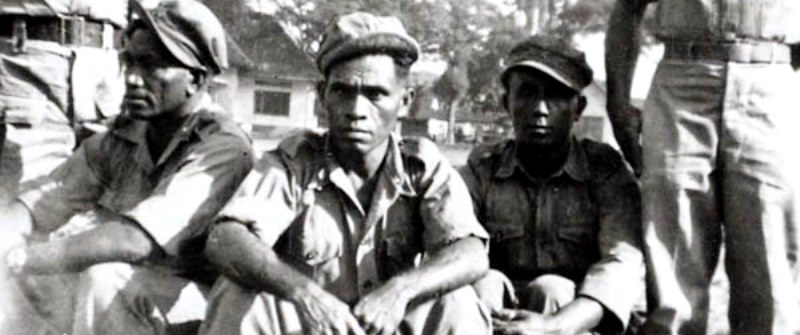
30 Sep Blog: Listening to testimonies of war crimes
By Wies Bakker and Paula Hendrikx
Oral history is a promising source for further research in the KITLV project on Dutch military operations in Indonesia between 1945 and 1950. Interviews with Dutch war veterans give new insights into the use of violence during the decolonisation war in Indonesia. To our surprise, many spontaneous references to war crimes are made within these interviews.
During the three months of our internship we have been occupied with the analysis and use of a vast oral history archive of the Stichting Mondelinge Geschiedenis Indonesië (SMGI). This archive was created between 1997 and 2001 and consists of more than 700 interviews with people who have lived in the former Dutch East Indies, including war veterans. These interviews make a valuable contribution to the KITLV project on the decolonisation war, which so far has focused on ego documents and archival sources. Firstly, the interviews provide insight into the perspectives of KNIL soldiers, who, so far, have been largely absent from written sources. Secondly, the stories of violence that are spontaneously and often implicitly shared with the interviewer can provide us with a better understanding of the conditions in which war crimes were committed by the Dutch military.
Research on war crimes conducted by the Dutch military in the Indonesian decolonisation war has focused largely on sources from Dutch perspectives. In these sources Dutch veterans have often passed responsibility for excessive violence onto indigenous soldiers of the KNIL (The Royal Dutch East Indies Army). Oral history interviews with such KNIL veterans express their perspectives, which have rarely been written down in ego documents or archives. By conducting new interviews with Moluccan KNIL veterans, we suddenly saw the war through Moluccan eyes: as experienced soldiers, they were often ordered to help those poor inexperienced Dutch soldiers who could not hold firm in the war without them.
Moreover, both in interviews of the SMGI collection and in interviews that were recently conducted, veterans did not shy away from talking about violence and war crimes. Surprisingly frequently they started talking about excessive violence on their own initiative, without the interviewer asking about it. Some even explicitly used the term ‘crimes’: “I have really seen several of those so-called war crimes. In the beginning I even participated in them out of enthusiasm. Burning kampongs et cetera…yes.” Most of the time however, references to war crimes were more or less implicit, but could still be distinguished with careful listening, and by paying attention not only to what people say, but also how they say it. Although references might be more implicit, veterans seem to be more open and spontaneous in talking about the use of violence, compared to official sources and published ego documents.
Oral history is of vital importance in the research on the decolonisation war. It gives a voice to the ‘voiceless’ and reveals personal experiences and reflections from within the military on the use of violence. Given the high frequency in which war crimes were mentioned, the use of oral history as a new method in this research is very promising. The KITLV is planning to continue this research and to conduct more interviews in order to include the testimonies of those veterans that are lacking in written sources. There is no time to lose, as there are only a few veterans who can still tell us about their experiences. We had the honour of contributing to the project in this pioneering phase of using interviews as a source. Hopefully this contribution has paved the way for the further use of oral history in the project on the decolonisation war in Indonesia.
(Wies Bakker (Utrecht University) and Paula Hendrikx (Leiden University) were interns for the project ‘Dutch Military Operations in Indonesia, 1945-1950’, researching the oral history collection as well as assisting during the preparation, execution and processing of new interviews with veterans of the war of independence in the Dutch East Indies.)




No Comments